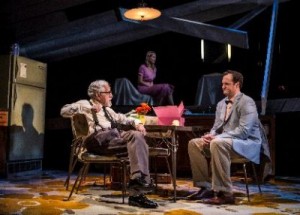
 [rating=5]The title of Noah Haidle’s play “Smokefall” is taken from “Burnt Norton,” the first poem in T. S. Eliot’s Four Quartets, and like Eliot’s most obscure work, it has footnotes, but don’t panic: they are in English, spoken by a narrator (Guy Massey), and relate directly to the dramatic narrative of the play. Like Eliot’s poem, the themes here are large and abstract: Time-Past, Time-Present, Time-Future, Original Sin, and whether Time is redeemable. Unlike in Eliot’s poem, these themes are explored through a defined, if surreal, narrative and the arguments of the play are clearly articulated. In this story, it will ultimately be up to the characters,’ and not God or at least not God alone—although we are assured by the Colonel that He does exist, to redeem Time.
[rating=5]The title of Noah Haidle’s play “Smokefall” is taken from “Burnt Norton,” the first poem in T. S. Eliot’s Four Quartets, and like Eliot’s most obscure work, it has footnotes, but don’t panic: they are in English, spoken by a narrator (Guy Massey), and relate directly to the dramatic narrative of the play. Like Eliot’s poem, the themes here are large and abstract: Time-Past, Time-Present, Time-Future, Original Sin, and whether Time is redeemable. Unlike in Eliot’s poem, these themes are explored through a defined, if surreal, narrative and the arguments of the play are clearly articulated. In this story, it will ultimately be up to the characters,’ and not God or at least not God alone—although we are assured by the Colonel that He does exist, to redeem Time.
In The First Act, we are introduced to a surreal, but recognizable family. Violet (Katherine Keberlein) and her husband, Daniel (Eric Slater) have moved in with Violet’s father, The Colonel (Mike Nussbaum) who is in the early stages of senility, but delivers nuggets of wisdom which permeate the entire play as its moral argument. If it is The Colonel who gives voice to the morality of the play, then Beauty (Catherine Combs), Violet and Daniel’s teenage daughter, is its moral compass. At the play’s beginning, she has long since ceased to speak because “she had nothing more to say,” and is living on an ascetic’s diet of bark, earth, and paint to try and atone for a moment when her parents, giving into anger and greed, fought with each other over money. Violet deals happily with these familial challenges, such as her father’s senility and Beauty’s strange behavior, as they come, and is looking forward to the arrival of expected twin boys to whom she is constantly singing a lullaby of welcome while Daniel, even while adoring his wife, daughter, and unborn sons, fears that he can no longer be a part of family-life, and is making plans to leave home.
In the Second Act, we meet the twins (Guy Massey and Eric Slater) in-utero where they have a discussion concerning Original Sin, Free-Will, Determinism, and the value of human life. The discussion begins comically, sounding exactly like the conversations certain types of undergraduates have in their dorm rooms late at night, except replete with clever jokes, but it quickly turns horrific. Unlike those students on the brink of adult life, these two fetuses, at the brink of infancy, care about the implications of what they are saying, and are willing to act upon their conclusions even before birth and in the most horrific ways. The scene is also more than a little grotesque: the conversation is happening while Violet is in labor, a fact made clear as much by lighting (David Weiner) and sound (Lindsay Jones) as it is by the twin’s dialogue. The Final Act is set in Time-Future. We encounter Johnny (Mike Nussbaum), last seen in the womb, as an old man on his birthday. He has spent his entire life thinking and publishing on themes first pondered in the womb, but nobody, including his son Samuel (Guy Massey), seems to care. When his older sister Beauty returns un-aged, it becomes clear that in this play Time operates arbitrarily, sometimes non-linearly, upon the various characters and the family itself. We watch in Time-Present as the characters go back into Time-Past even while they stay in Time Future—to borrow classifications from Eliot’s poem and the program (Thankfully, these shifts never become confusing for the audience, and we are able follow what is happening and when it is happening from earlier referents). Time’s arbitrary behavior both complicates and helps Johnny, Beauty, and Samuel understand the past, make conclusions about their lives, and put thetrauma of their family to rest.
On a technical level the play echoes the writing, and is largely successful. The superb costumes (Anna Kuzmanic) tend towards the dreamlike and surreal, but do so nearly unnoticeably in that they never look out of place. A large and impressive set by Kevin Depinet is abstract and postmodern, but still convincing as a domestic space. Likewise, Director Anne Kauffman has skillfully blocked this play so that the actors’ movements teeter between gracefulness and verisimilitude.Overall, the acting was extremely strong, but I wish Eric Slater had conveyed more confusion, desolation, and heartbreak as Daniel over his conviction that he would have to leave a family he loved if he was going to live his life. I realize that the origins of such convictions are mysterious to those that experience them, and I think Ms. Kauffman had this in mind when directing Slater, but the emotions themselves should not remain a mystery to the audience. Fortunately, Mr. Slater’s reserve as an actor never gets in the way of Katherine Keberlein’s performance. She is able to capture Violet’s sweet disposition and character without ever losing sight that this is a woman constantly forcing herself to go on loving through each calamity.
The best part of the acting is the chemistry between the young Catherine Combs as Beauty, and the venerable Mike Nussbaum as The Colonel and Johnny. They are equally convincing as devoted granddaughter and grandfather in the first act, and as devoted brother and sister in the last. Ms. Combs is pitch-perfect as Beauty who in The First Act conveys an incredible intensity of compassion, sacrifice, and devotion to those around her while barely speaking a word. This other-worldliness is never lost in Act III in which she speaks frequently and with meaning as an older but physically unchanged Beauty. Her unwavering commitment to her family in Time Past, Time Present, and Time Future is still expressed in her non-verbal acting as much as it is in her dialogue which she delivers with equal skill.
Mr. Nussbaum plays against this other-worldliness even as his character insists “God exists. Remember, I said that.” He is able to simultaneously convey senility and a worldly wisdom both as The Colonel and Johnny. At a venerable age, he is still able to deliver the moral arguments of the play so affectingly that we hear it in our minds as we leave the theatre (just as feel Ms. Combs compassion as Beauty): “The value of life is in the attempt,” “your credit rating does not say anything about who you are,” and “the greatest possible act of courage is to love.” No doubt all these things have been said before, but in a time and place where courage is still defined in the context of warrior ethos, and spiritual franchises are built on the denunciation of orthopraxy, they are worth saying again, and seldom have they been said this beautifully. “Smokefall” is running through October 26th at The Goodman Theatre which is located in downtown Chicago at 170 N. Dearborn Street. Performances are at 7:30pm on Wednesdays , 2pm and 7:30pm on Thursdays with no 2pm performance on October 23rd, Fridays at 8pm, Saturdays at 2pm and 8pm with no 2 pm performance on October 4th, and Sundays at 2pm and 730 pm with no 7:30 performance on October 19th or October 26th. Regular Tickets are between 25 and 81 dollars; subject to change. You can purchase tickets at the box office, by phone at 312-443-3800 or online at www.goodmantheatre.org. Half-price Mezztix are available at 12 Noon at each the box office.
To see what others are saying, visit www.theatreinchicago.com, go to Review Round-up and click at “Smokefall”






More Stories
“Joe Turner’s Come and Gone”
“How I Learned What I Learned” reviewed by Julia W. Rath
“How to Know the Wild Flowers: A Map” reviewed by Julia W. Rath